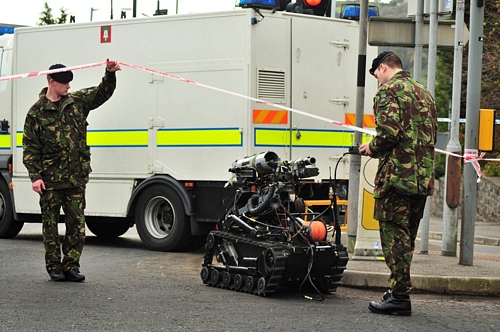
ACCEPTABLE LEVELS
UK, 1983, 100 minutes, Colour.
Andrew Rashleigh, Kay Adshead, Sally Mc Cafferty, Roisina Brown.
Directed by John Davies.
Acceptable Levels is a documentary drama about Northern Ireland. The film has been the topic of commercial movies; The Gentle Gunman, A Terrible Beauty, Shake Hands With The Devil, Young Cassidy. There have been versions of Sean O' Casey's plays. In the '80s there was Ascendancy, Looking Back at 1921, as well as The Writing On The Wall, a drama of Northern Ireland with actors from a theatre workshop acting out situations and roles. This method has been used for acceptable levels.
There is a story of a BBC team interviewing people in Northern Ireland and filming a documentary. There is also the story of the people interviewed. The two strands are well-interwoven, almost making the audience believe that they are not watching the film but rather the preparations for film-making.
Ultimately, there is violence and difficulties for the British administration in allowing the film to and what can and cannot be presented. The title is a reference to a quotation from Reginald Maudling who in the early '70s said of Northern Ireland that he hoped there would be a return to 'acceptable levels of violence'. The film is full of insight as well as observing closely life in Northern Ireland. With its own self-criticism about editing and documentary filmmaking, the audience is invited to be critical throughout the film.
1. Impact of the film? Presentation of Northern Ireland? Peace and war? The troubles? An insight into filmmaking and editing?
2. The impact for the Northern Ireland audience? Their own reaction to the documentary when finally screened? For English audiences, world audiences? Qualities of observation, understanding? Emotional response? Urgency?
3. The documentary style? The quality of observation, the interviews, discussion, analysing the processes for the filmmaking? The presentation of life as lived when unobserved? Home life, social life, work, unemployment? The build up to the suburban situation and the killing? The importance of editing, audience manipulation? The reasons for what is filmed, presented? The film inviting its audience to be critical of it?
4. Audience knowledge of Northern Ireland? Sources of this knowledge, media information, media manipulation? The appropriateness of the concept of 'acceptable levels' of violence in Northern Ireland?
5. The issues of right and wrong, right and left, extremism? The comment made that when issues are urgent right and wrong is less clear and there is need to get to the heart of the people?
6. The portrait of the Mc Ateers and their ordinary way of life? The father and his unemployment, sitting at home, watching television, attitude towards his kids, his wife, outings? The mother and her fussiness, tidiness in the home, concern about the children? The young girls and school, recreation? Tony and the adolescent, the dangerous situations, the beatings by the British soldiers etc.? The home situation, the flats? Work and unemployment? Suburban lifestyle? Friends, outings? The Catholic background? The picture of the Sacred Heart and Tony using it as a mirror to comb his hair? The priest, the severe nun? Work in the school? Church and school? The parallel with suburban life anywhere? Preoccupations, bombs, death? The opening bashing? The socialising and political associations with dance halls etc.? The request to participate in the programme? Sue Mc Kenna making friends with the family? outings with them, social, the supermarket? The decision to have Roisine interviewed? The programme's focus on children? The death of Jacqueline and the reaction? Interviewing Roisine? The quality of the interview and the revelation about the way of life? Its being edited from the final version? The family watching television? Their reaction to the programme? The quality of the presentation of the home life, as if the audience were simply observing, invited to be part of the family yet detached? The effect for an insight into a family?
7. The portrait of neighbours, friends? The mother of the dead girl and her consolation? The priest and his helping Sue Mc Kenna, the visit to the home? The nun and her severity in the school corridor? The friendly neighbour ? and her offhand manner? Life in the street, death in the street, the hysterical woman being interviewed?
8. The soldiers and their presence in Northern Ireland? The initial bashing of Tony and his friends? The police holding up Sue and checking on her identity? The British and their attitudes? The interview with the commanding officer, public relations, attitude towards the people, prejudice against the Irish? The role of the Ulster constabulary and its responsibility? The turning off of the National Anthem and the image of the Queen from television? Detail highlighting antagonism? The talk about murders, massacres of British soldiers etc.? The impossibility of determining right and wrong?
9. The television crew? Sue and her rise to eminence, conscientious? The production discussions and designing of strategies? Sue with the family, seeing them at work, talking? Sue seen as being 'Liberal'? Her persuading Roisine to be interviewed? Her criticisms of the final production, her not fighting it, thinking of her career? Her viewpoint? The viewpoint of the director and his text written before his arrival in Ireland? His soft manner in interviewing, the appropriateness and incisiveness (or not) of his questions? Manoeuvring and manipulation? Conscience, the death and the photographing of the death, reaction, the hysterical woman? Phone calls to England? The questions about editing, eliminating of material? The background of the local crew, photographer, sound man? Mr. Mc Ateer and his suggestions for the film and their rejecting them? Their own socialising in Northern Ireland?
10. Aspects of Belfast ? detail of daily life, the days, the nights, the business centre of the city, shops, restaurants? ordinary life going on within the military context?
11. How well-drawn the characters? Authentic? The presentation of truth? An insight into truth? The film as manipulation/art?